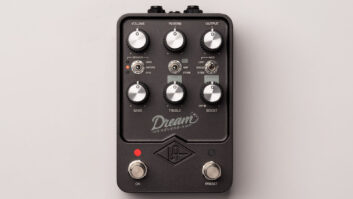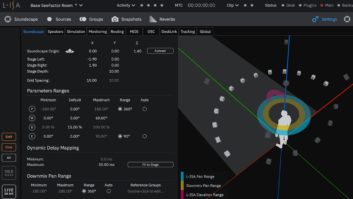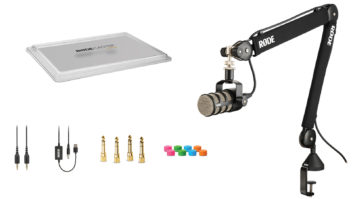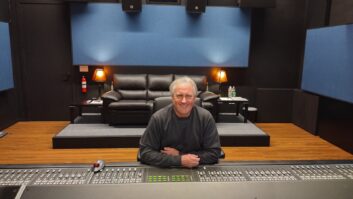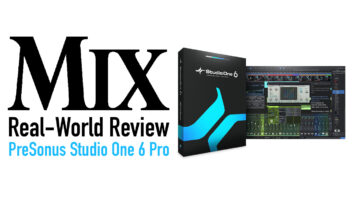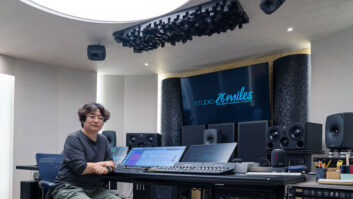Elliot Scheiner remembers a time when working in a studio meant a commitment far exceeding what was reasonable: “When I first started in the business, working for Phil Ramone, I knew it was the luckiest day of my life. I was going to do whatever it took to be successful as an engineer.
“I never thought twice about the number of hours I was putting in on a weekly basis. I remember one session for a movie that lasted 70 hours. The only time I left the console was to eat and go to the bathroom. At 22 years old, I didn’t care much about anything else. I didn’t know that regimen would last another 30 years! Always going into the control room and working, without using anything to relax my body for the rest of the session, became the norm.
“At some point I realized I needed to do some kind of exercise, whether it was walking or physically doing something before I came to work. I’m sure most of the younger engineers totally understand. My son is an engineer and he tells me that he’s at a gym every morning before work. For those of you who have never thought about exercise, the time is now.
“You can’t just work and eat over the course of a day. Find time to exercise when you’re working, even if it’s just to take a walk, even if it’s just in the complex—walk and relax. I can’t tell you how many engineers paid a high price for not taking care of themselves. You don’t want to end up like that!”
Al Schmitt agrees, taking it further: “Try to reduce stress and make sure you take breaks. These are some of the reasons why I’ve been doing this forever.
“When I first came to Los Angeles, I noticed that everyone belonged to a gym, so I joined one, too. I started working out when I was off and I started doing Pilates three times a week. I was having back problems at least once a week, but once I started Pilates, that all went away. Now, no more back problems. When I have time, I do add some light treadmill.
“When mixing, I get up for about five minutes every half hour and walk the halls of the studio. I’ll take a walk and clear my head. This can be fun because you never know who you will run into. I watch my diet, don’t smoke or drink. I also try to meditate at least once a day; this is a wonderful thing if you know how to do it. It can give you and your work some perspective.”
Chuck Ainlay’s story includes some competitive motivation: “I can’t say that I’ve always been a beacon of health, especially in the beginning of my career, when the days were long and one ran into the next, seemingly endlessly. I was so eager to be working in a studio and hanging out with all the amazing musicians that it really never occurred to me that I needed to think about my health.
“At some point, though, I rediscovered my love of waterskiing, and that may have been one of the best things to happen to me. Just like engineering, I wasn’t happy being just a recreational waterskier, so I started competing, which meant I had to start looking after the substances I was putting in my body, food and otherwise. I discovered that my hearing improved as a result of the increased blood flow. After all the years of being a studio rat, I still get to do what I love, and I attribute that to staying active and eating right.”
Find time in your day to exercise, join a gym and commit to taking care of yourself. If you work out of your home, making a workout space can be nearly as important as the studio you’ve crafted. Develop good habits like scheduling “me time” just like you schedule anything else, and set your expectation to include a prolonged career. To do that, you need to maintain a level of energy that allows you to pursue your motivation. Think about how hard it is to get better—at anything, really—when you don’t have the energy to get off your ass. Then go do it.
The METAlliance—Al Schmitt, Chuck Ainlay, Ed Cherney, Elliot Scheiner, Frank Filipetti and George Massenburg, along with the late Phil Ramone—has the dual goals of mentoring through our “In Session” events, and conveying to audio professionals and semi-professionals our choices for the highest quality hardware and software by shining a light on products worthy of consideration through a certification process and product reviews in this column. Our mission is to promote the highest quality in the art and science of recording music.
METAlliance • www.metalliance.com
SIDEBAR: You Gotta Move
Like the old blues song says, you gotta move. A 2012 study published in JAMA Internal Medicine found that the more time you spend sitting every day, the greater your chances are of dying prematurely. After examining more than 222,000 people, researchers determined that adults who sit for more than 11 hours a day have a 40 percent greater risk of dying of any cause within three years. Even if you are sitting a bit less—say eight to 11 hours a day—your chances are still 15 percent higher than they are for someone who sits less than four hours a day.
If that routine sounds a little familiar, you’re not alone. According to that same study, less than half of American adults meet the physical activity recommendations of the World Health Organization of a minimum of 150 minutes of at least aerobic physical activity throughout the week. That’s not a lot of time when you consider the payback; according to the study, you’ll reduce the risk of chronic disease, including cardiovascular disease, Type 2 diabetes and certain cancers.
The correlation is pretty clear but the study spells it out anyway: “Shorter sitting times and sufficient physical activity are independently protective against all-cause mortality, not just for healthy individuals, but also for those with cardiovascular disease, diabetes, overweight, or obesity.” So do yourself a favor: step away from your music and move around. Everyone wants to create a mix to die for, but don’t do it literally!
